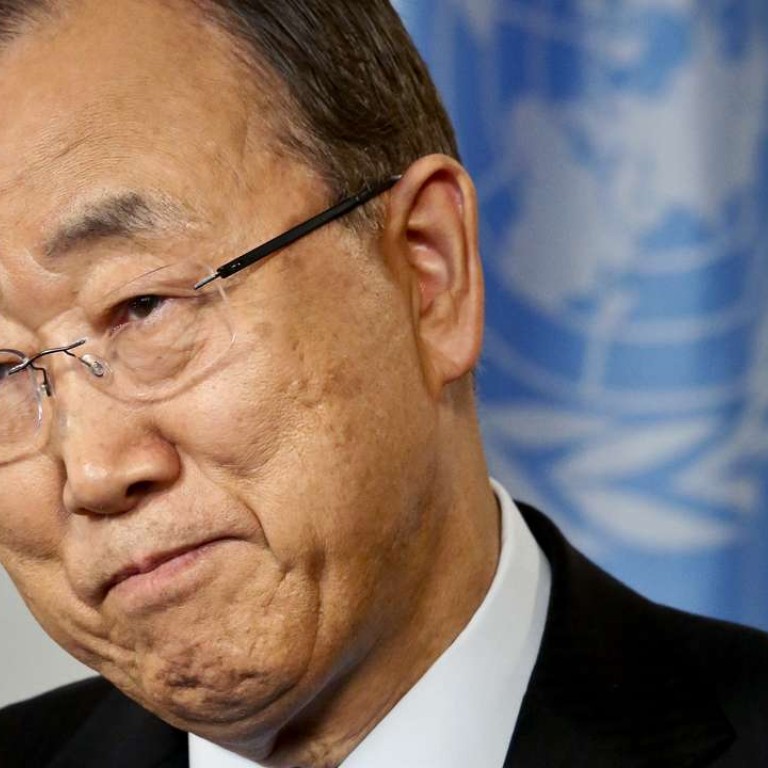
Ban Ki-moon’s lament: after decade at top, UN chief is disappointed in power-hungry world leaders
US Secretary-General cites Syria as an example of a nation being held ‘hostage’ to the destiny of one man, President Bashar Assad
UN Secretary-General Ban Ki-moon says he’s disappointed by many world leaders who care more about retaining power than improving the lives of their people — and can’t understand why Syria is being held hostage to “the destiny” of one man, President Bashar Assad.
Nearing the end of his 10 years at the helm of the United Nations, Ban spoke frankly about the state of the world and his successes, failures and frustrations as UN chief in a wide-ranging interview.

“People say I have been quiet, and I have not been speaking out about human rights, but I can tell you I have been speaking out (more) than any of the Western leaders” who “are very cautious,” he said. “You have not seen people as fearlessly speaking out as myself.”
I do not want to criticise all of them while I’m in power
Ban also spoke candidly about his frustration at the way the UN operates.
It’s unrealistic to expect any secretary-general “to be some almost almighty person,” he said, because the world body’s member states make decisions and the UN chief implements them — rather than implementing their own initiatives and policies, he said.
The UN could be far more efficient and effective if there were “some reasonable decision-making process” — not one that requires consensus on many issues before the General Assembly and statements by the Security Council, Ban said. This gives one country the power to block something all other nations agree on, or to water it down.
“Is it fair? Is it reasonable in the 21st century when you have 193 member states?” Ban said.
As an example, human rights groups have criticised the declaration set to be adopted at the UN summit on refugees and migrants on Monday, ahead of the General Assembly’s annual gathering of world leaders, because it was watered down to reach consensus. The result was the elimination of Ban’s proposal to resettle 10 per cent of the world’s refugees annually.
Ban said member states have the power to change the consensus requirement easily and quickly.
The secretary-general said face-to-face meetings with world leaders are critical to try to get support on ending conflicts or on issues like climate change and combatting poverty.
“I’ve been saying, I can issue a hundred statements from here, but if you really want to get that apple dropped, you have to go and shake the apple tree,” he said.
Ban said the turmoil the world is suffering today isn’t from the people, but is “caused by the leaders.”
For many leaders, the key is to be elected “by whatever means,” Ban said. “Once elected ... they rule over people, and they are mostly corrupted, and they do not respect the voices of the people.”
Speaking with evident frustration about the more than five-year conflict in Syria, Ban said “I simply cannot understand why we have not been able to resolve this issue.”
He pointed to the “lack of commitment to principles,” particularly by the Syrian leadership.
“Why is it so important for one man’s destiny? One man’s destiny should not work as a hostage of all this crisis,” Ban said, referring to the dispute between pro-government and opposition supporters over whether Assad should have any role in Syria’s future.
As for his own future, Ban said he will be returning home to South Korea but he deflects widespread rumors that he will be a candidate for president, saying his job is being secretary-general through December. 31. As a private citizen, he said, he will “spare no efforts” to help promote reconciliation with North Korea if there is an opportunity.
What about writing a book about his decade as secretary-general?
“One day, many years later, and I’m not in a position to write soon, but I can speak more freely because I do not want to criticise all of them while I’m in power,” Ban said.

